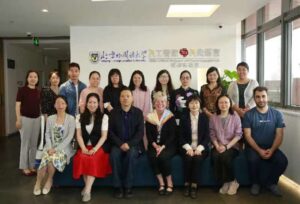 Colleagues from UNICollaboration recently presented an exciting new and ongoing collaboration with China at the annual conference of the Open University’s Computers and Learning Research Group.
Colleagues from UNICollaboration recently presented an exciting new and ongoing collaboration with China at the annual conference of the Open University’s Computers and Learning Research Group.
In May/June this year, UNICollaboration’s Dr Mirjam Hauck and Dr Rita Koris, conducted a bespoke Introduction to Virtual Exchange training with Beijing Foreign Studies University (BFSU).
This was the result of a joint teacher training programme between The School of Languages and Applied Linguistics (LAL) and the Open University’s Online Confucius Institute and Beijing Foreign Studies University (BFSU).
The training was open to OU LAL Associate Lecturers and BFSU educators, who also benefited from an onsite session in the final training week.
The approach, as with all training at UNICollaboration, is inspired by experiential modelling, so educators are encouraged to make use of the online tools and processes that they would use in their teaching and experience them from a learner’s perspective.
The main aim of the training was to introduce participants to Virtual Exchange (VE) pedagogy, support them in finding a Virtual Exchange (VE) teaching partner and to inspire them to jointly design, implement and evaluate exchanges as part of their teaching practice.
The training included weekly online sessions with the participants where they were able to discuss concrete examples of Virtual Exchange projects and they were encouraged to develop their own ideas for future VEs within their institution.
This in turn should lead to increased Internationalisation at Home and inclusion for those students who are unable to travel for socio-economic or other reasons. The focus was on how to make language teaching online more engaging and authentic.
Feedback has been overwhelmingly positive. OU participant Dr Doris Hermann Ostrowski says:
“Thank you for the wonderful experience and opportunity to delve into the world of Virtual Exchange.
I found the course extremely informative and engaging. It addressed key aspects of VE employing a diverse array of teaching methodologies.
The modules were meticulously planned while also leaving room for adaptation to the specifics of the participants.
I would wholeheartedly recommend this course to any educator interested in incorporating virtual exchange in their pedagogical repertoire.”
Plans are underway for further training and collaboration in the coming months.
